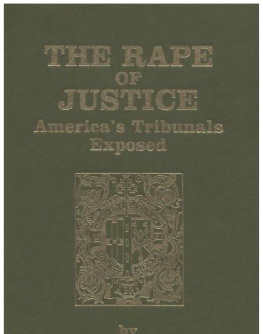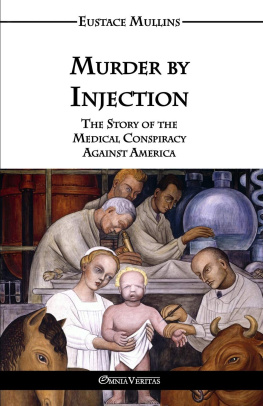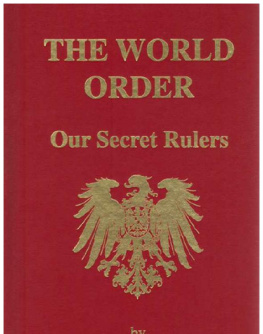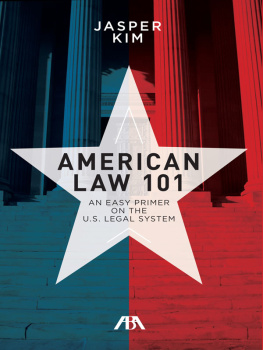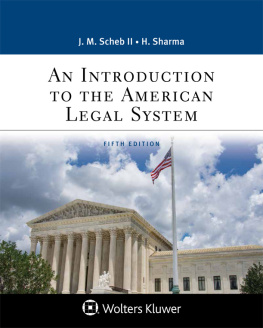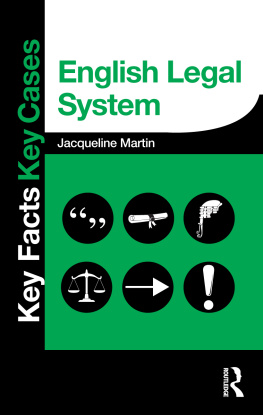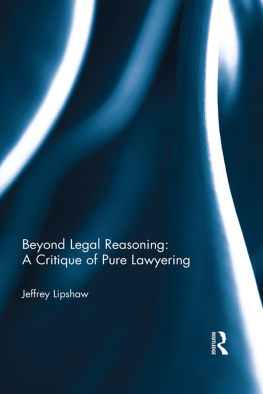THE RAPE OF JUSTICE
Americas Tribunals Exposed
THE RAPE OF JUSTICE Americas Tribunals Exposed
Published by the National Commission for Judicial Reform P O Box 1105 Staunton VA 24401
First Edition
Copyright 1989 Eustace Mullins
ALL RIGHTS RESERVED
No part of this publication may be reproduced, stored in a retrieval system, or transmitted in any form by any meanselectronic, mechanical, photocopy, recording, or otherwise without express prior permission, with the exception of brief excerpts in magazine articles and/or reviews.
Printed in the United Stases of America
for
JANE KATHARINE MUSE MULLINS
"the mother makes all things possible"'
Books by Eustace Mullins
Secrets of the Federal Reserve My Life in Christ
This Difficult Individual, Ezra Pound The World Order A Writ for Martyrs The Curse of Canaan Murder by Injection
ABOUT THE AUTHOR
The Legal Studies Group of the National Commission for Judicial Reform presents this latest investigative research coup of Eustace Mullins, in the hopes that it will aid the citizens of America to reduce the odds against winning a favorable decision in our courts. A native Virginian, Eustace Mullins is a descendant of William Mullins, whose name is on the Mayflower Compact, a government code written for the Mayflower settlers, and the first compact written in the New World. He served thirty-eight months in the United States Army Air Force during World War II. He was educated at Washington & Lee University, Ohio State University, the University of North Dakota, New York University, Escuela des Bellas Artes, San Miguel de Allende, and the Institute of Contemporary Arts, Washington, D. C.
His name, Eustace, means Justice, in Aramaic, the language spoken by Jesus Christ.
In his forty years of investigative work, Eustace Mullinss rapid progress was made possible by his becoming the protege of Ezra Pound, the leading literary force of the twentieth century; George Stimpson, founder of the National Press Club, and the most respected journalist in Washington, D. C.; and H. L. Hunt, the business entrepreneur with a consuming interest in good government. After Ezra Pounds passing, Eustace Mullins founded the Ezra Pound Institute of Civilization, which carries on Pounds ground-breaking work in literature and economics.
Contents
Foreword
In my travels throughout the United States, I have found that the first complaint of our citizens is the sorry state of our legal system. They do not complain that the laws themselves are onerous, but rather that their administration is almost universally unfair and unjustified. I have even heard farmers arguing with each other at their markets, each protesting with inverted pride that Our county has the crookedest lawyers and judges in this state, only to be met with the fervent response from a farmer representing another county, Oh, no, our lawyers and judges are a lot crookeder than the ones in your county!
Americans recognize that we must have laws, and that we must abide by them, otherwise life would become intolerable. The problem is that law-abiding citizens are usually greeted in our courts with disbelief that anyone still obeys the laws in this nation, and two, that a legal system which is operated by and for criminals has no greater enemy than the law-abiding citizen.
The first purpose of law has always been Salus Populi, the safety of the people. I write this in a building which has five locks on every door. Twenty-five years ago, the doors were never locked. We hardly knew where the key to the front door was kept. With hundreds of other citizens in Washington during its tropical summers, I went to a nearby park to sleep in the era before air conditioning. Today, no one in his right mind would close his eyes in a Washington park, either by day or by night. It is rightfully known as the murder capital of the world, rather than as the capital city of the United States of America.
This situation has been created, not by the negligence of the police, who are working harder than ever, but by the legal system, which abruptly denied the previous basis of our legal system, Salus Populi, in 1933, with the advent of President Franklin Delano Roosevelt, who adopted the Marxist concept that the legal system was being used unfairly to defend property. Because of the Communist decree that all property was now the property of the state, the legal system need no longer defend crimes against personal property. This was soon extended to crimes against persons. The doctrine of compulsory equality meant that no citizen was entitled to wear a gold watch or to live in a large home. Other citizens who wished to deprive them of their excess property, even at the cost of their lives, were looked upon with approval by the legal system. If they injured or killed too many citizens in their exuberance, they might be confined for a short time, but they were soon released to continue the Marxist campaign of levelling, that is, of reducing all citizens to a common level of fear and despair. This goal was first achieved in the Soviet Union, when Wall Street bankers financed the noble experiment in compulsory equality. Soviet Russia was reduced to a giant concentration camp, a Gulag in which tomorrow might be worse than today, but it would surely be no better. The United States has travelled that same road with remarkable speed, constantly accelerating the techniques which force our citizens to new levels of personal depth and degradation.
Under this Marxist system, our citizens have found that the legal system is now something quite apart from the law, that is, the fixed doctrine under which we live. A law is a fixed power. In contrast, the administration of the law today is a fluid power, in flux, and subject to outside influences, mainly the power of money and its concomitant political influence. When an American citizen comes into court today, he is not faced with the power or the majesty of the law. To his dismay, he finds that this force is no longer present. Instead, he finds that he is facing the power of money, and the power of political influence.
Traditionally, the scales of justice are depicted as awaiting the weight of the evidence. A preponderance on one side or the other will tip them to a just conclusion. Indeed, this is the ideal to which we still aspire. Unfortunately, it is rarely found today in our courts. If an attorney finds that the weight of evidence is tipping the scales against his client, he immediately employs one of the myriad techniques of civil procedure to have that evidence declared inadmissible, to have his opponents witnesses impeached or found incompetent, and to mount a counterattack of his own to tip the scales back to favor his client. This technique is called practicing law. Like any other skill, it is honed by constant practice, but this skill depends heavily on its practitioners willingness to employ any subterfuge on his clients behalf. It is as though a football game were being played during which the players were allowed to commit any unsportsmanlike or illegal act in order to gain a point, with the umpire (that is, the judge), actually cooperating in and officially approving the illegal conduct. In legal parlance, this has a name; it is known as professional courtesy, because the judge, like the lawyers, is also a member of the bar.

